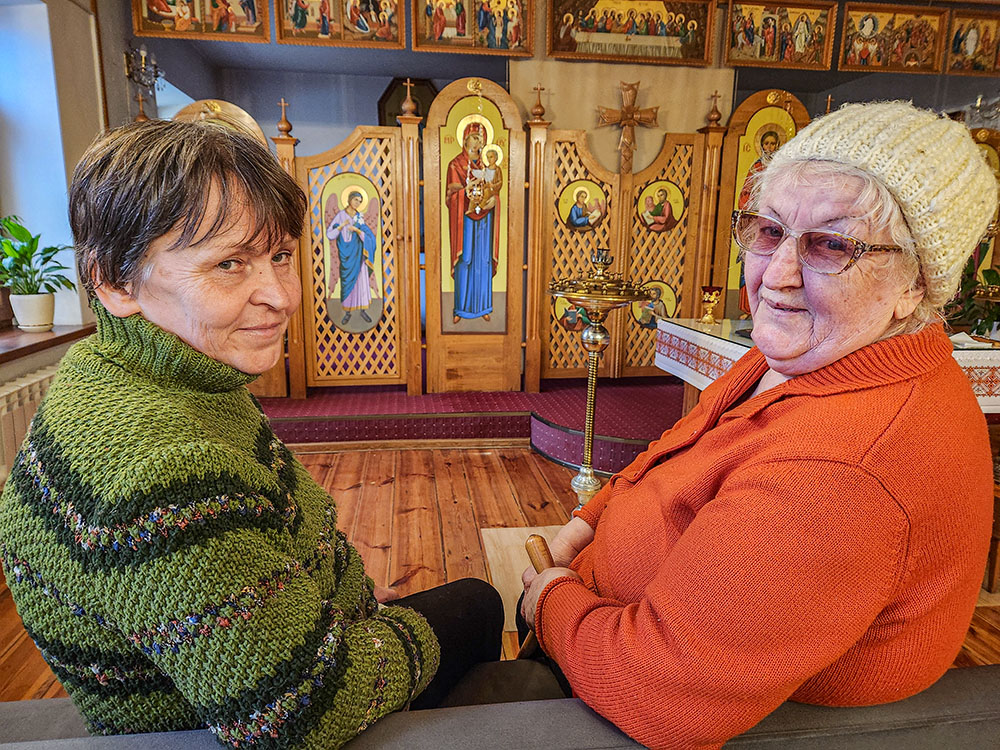
Diakova Lubov, 58, left, and Petrova Yevdokia, 80, right, two women displaced during Russia’s full-scale invasion of Ukraine, visit the chapel of the convent of the sisters of the Order of St. Basil the Great in Zaporizhzhia, Ukraine. (GSR photo/Chris Herlinger)
Editor's note: Chris Herlinger, Global Sisters Report international correspondent, has reported multiple times from Ukraine since Russia' s full-scale invasion of the country in 2022. A new book, Solidarity and Mercy: The Power of Christian Humanitarian Efforts in Ukraine, published by Morehouse Publishing, compiles his work for GSR and NCR with new additional reporting.
In these excerpts adapted from the book, Herlinger profiles two women displaced in the war and the work of Sr. Lucia Murashko and other members of the sisters of the Order of St. Basil the Great in the eastern city of Zaporizhzhia.
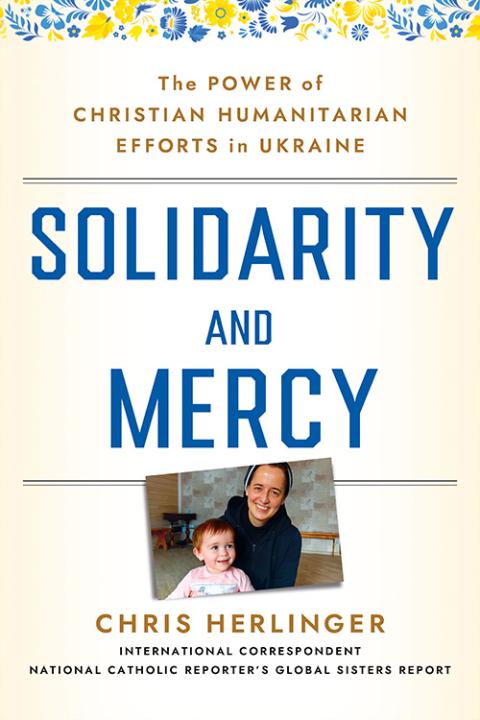
In early February of this year, I accompanied Sr. Lucia Murashko to a distribution in Zaporizhzhia of donated backpacks, school supplies, hygiene items, blankets and other household supplies outside of a dormitory that has been converted to residence for the displaced from villages like Preobrarzenka (not far from Zaporizhzhia) and from other locales in eastern Ukraine.
The distribution to the group was orderly and was brightened by the presence of children, who delighted in the backpacks Sister Lucia handed them.
She met two women, Petrova Yevdokia, 80, and Diakova Lubov, 58, residents of the dormitory and regular recipients of the aid, and took them back to the convent for tea and to talk about their experiences.
Both are courageous, brave, steadfast women who have had to endure physical challenges in their lives: Diakova is a cancer survivor and spoke with difficulty after a series of surgeries, including one that cut one of her vocal cords.
"I learned how to survive," she said. Meanwhile, because of an incident that occurred while she was fleeing bombardments, Petrova lost some front teeth, now replaced with gold crowns.
Diakova spoke first, noting that life in the dormitory is simple and spare, with shared quarters — but is certainly preferable to a life fleeing bombardments. She was once a resident of Preobrarzenka and worked as a postal worker — a job she enjoyed and remembers fondly because it afforded her dignity and some prestige. ("Every day I was greeted like a president, people saying 'Good morning.' I had such work!")
But such memories have been eclipsed by recollections of Russian bombardments that began in March 2022 and continued through October of that year, when she finally fled. Diakova opted to stay for seven months because, like those who still remain in the village, she did not want to leave. But it got to be too much: The sound of nighttime artillery shelling became hellish and the deaths of two village residents — two electrical workers — convinced her it was time to leave.
A widow, Diakova said she owes her life to one of her cats, Asia, who called her to a different room than her bedroom, in which windows were destroyed during an explosion. "That cat saved my life," she said. She had returned to the village just once to pick up some documents and to feed the cat, as well as another feline named Masian. Diakova hopes that Ukrainian soldiers who were now living in damaged residences might be taking care of the cats. (Pets are not allowed in the dormitory where Diakova is residing now.)
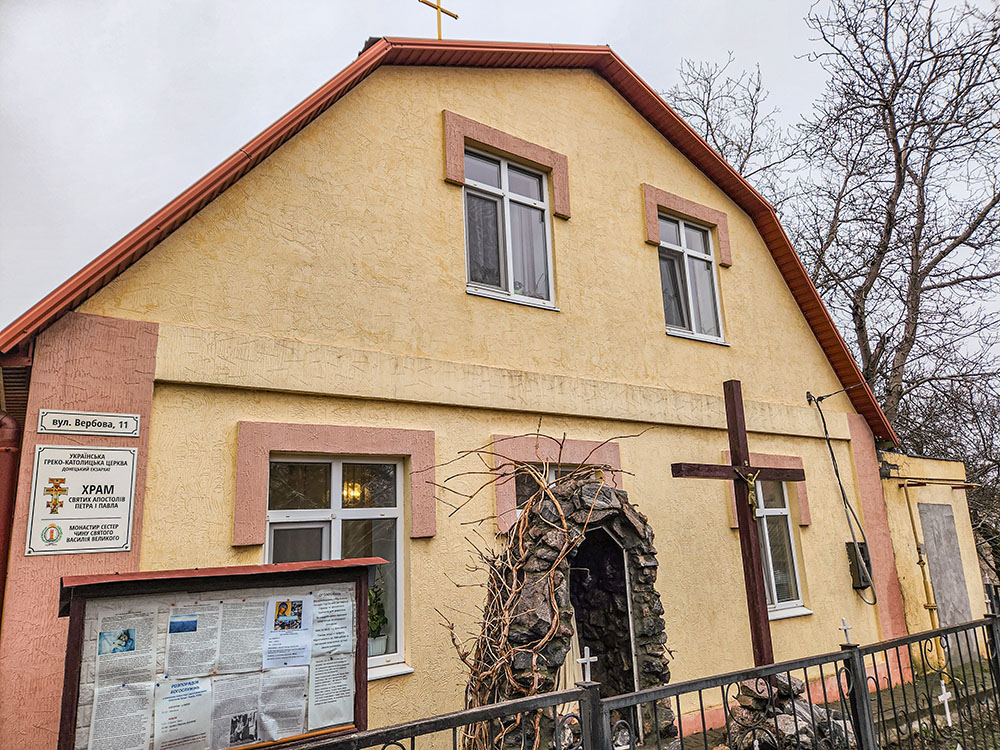
The convent of the sisters of the Order of St. Basil the Great in the eastern city of Zaporizhzhia, Ukraine. The convent houses the sisters but also visitors, and is also a place of worship and something of a community center. (GSR photo/Chris Herlinger)
Though she misses home, Diakova told me her current residence is supportive — residents help each other, share meals and the like, and Caritas has provided psychological help with trauma.
"We're like a family now," Diakova said.
Petrova was initially more measured in her comments. Like Diakova, she is a widow, and also like Diakova, she has endured hardship even before the war — her daughter died almost 10 years to the date before the full-scale invasion and she has been raising her granddaughter (17-year-old Diana) since then. The two are from the eastern city of Mariupol — a major site of battle during the initial months of the full-scale invasion, and one that fell to Russian forces in May 2022.
Petrova's memories of that experience are searing: She and more than a dozen others — 10 adults and seven children — took shelter in an apartment basement and stayed there for 20 days with little food or water with shelling all around them; one person got the courage to leave briefly to retrieve some bread; those in the shelter shared it — a moment of holy symbolism.
"The danger gathered us together," she said. (I later heard a similar story about a Protestant church in Bucha that had housed as many as 170 people — all of different faiths — for three weeks during the Russian occupation there.)
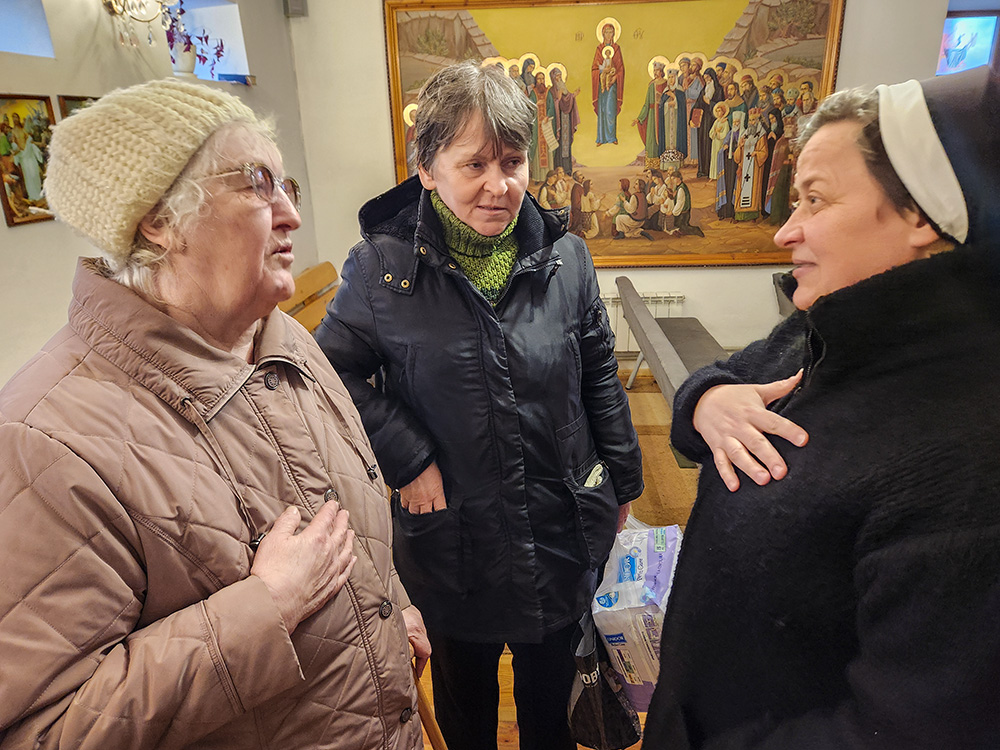
Basilian Sr. Lucia Murashko meets with two visitors at her convent, Petrova Yevdokia, 80, left, and Diakova Lubov, 58, center. Both women were displaced during Russia’s full-scale invasion of Ukraine and both now live in Zaporizhzhia, Ukraine. (GSR photo/Chris Herlinger)
On the 21st day, the group learned a humanitarian corridor was being formed that allowed them to leave the building, go to another site by bus, and ultimately to a hospital building. Petrova teared up when talking about the loss of her teeth — she fell on a pavement — but also in recalling seeing bodies outside as the group ran to buses for safety. "In a situation like that, you don't know who is shooting," she said, crying.
The evacuees briefly came upon a group of Russian soldiers who offered them some food — meat and bread. For that, they were grateful. But that was a brief encounter in an otherwise chaotic moment: "We ran and ran but we didn't know where to run," Petrova said.
Eventually the group arrived at the hospital, where they stayed for two days. She and Diana had enough cash to pay several drivers to take them to Zaporizhzhia — they had to go through 20 checkpoints to do so and arrived at a converted shopping center like the ones on the Polish border I had visited. Petrova said she was at a loss — with no money, no fresh clothing, and then, for a time, becoming separated from her granddaughter.
After staying briefly with a woman who offered her help, Petrova settled in the Zaporizhzhia dormitory but said she was desperate to find her granddaughter; eventually soldiers who investigated available records of displaced persons located Diana, much to Petrova's relief. "I had become so sick and didn't have any further strength. I needed help," the grateful grandmother said. Of her reunion with her granddaughter, Petrova added, "Of course we were so happy."
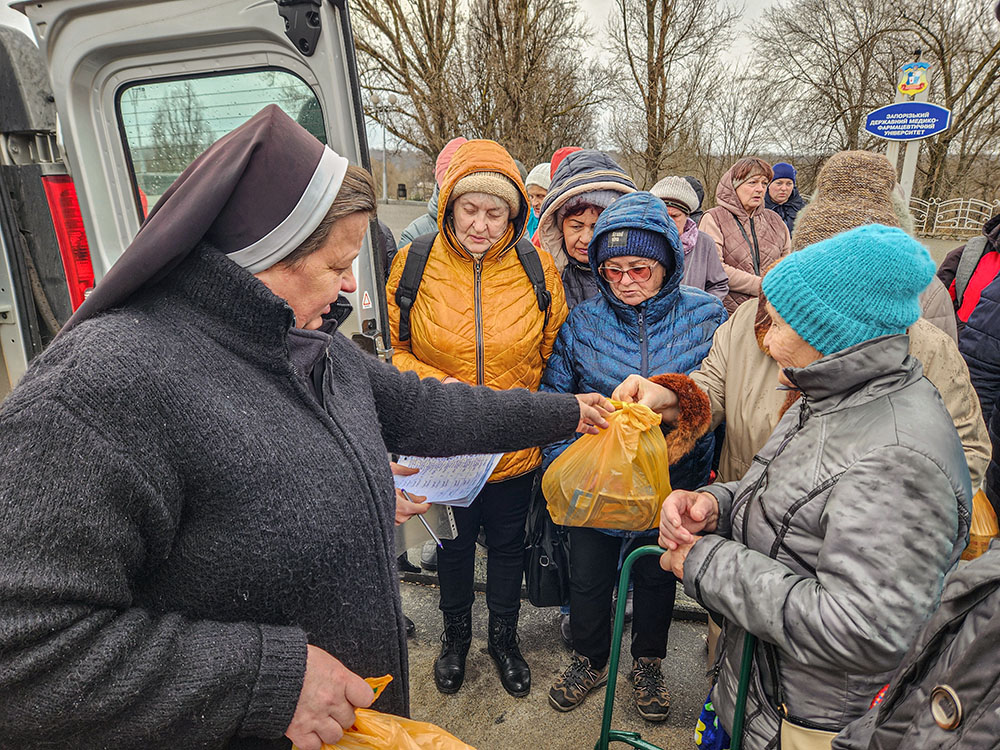
Basilian Sr. Lucia Murashko works during a distribution of donated backpacks, school supplies, hygiene items, blankets and other household supplies outside of a dormitory in Zaporizhzhia, Ukraine, that has been converted to residence for displaced persons. (GSR photo/Chris Herlinger)
Life had settled some; though the two women remain dependent on humanitarian aid, Diana was now in school, learning computer technology and also sewing. She hopes to become a photographer.
Petrova still has two daughters in Mariupol and a son in Belgium. I asked Petrova if she would want to return to Mariupol or live with her son. She said no, particularly to the idea of returning to Mariupol, saying she doesn't like the idea of reliving bad memories. But she, like Diakova and so many of her compatriots, remained confident of Ukraine's ultimate victory. "We will win," she said assuredly.
I asked both Petrova and Diakova if they felt they could forgive the Russians for what had happened. Petrova said it was true that Russian soldiers had, for a moment, helped her and others fleeing.
But she felt confusion about who she could ultimately trust. "When I lay in my bed and think about what I went through, I think it would be difficult to forgive," she remarked as we spoke in the small but brightly adorned chapel space in the sisters' convent. Diakova was more unequivocal. She joked that her surname is similar to the Ukrainian word for love — but in the end, she said, "I can't forgive."
Though these comments hinted at bitterness, Petrova acknowledged the blessings she and others had experienced because of the humanitarian work of Catholic sisters. "We're very happy that the sisters are still remembering us when others are no longer giving aid."
Tired of war but not giving up
Sister Lucia, of the Order of St. Basil the Great, calls her early-morning hours in the convent "coffee with Jesus," and I was honored to be invited in the small convent kitchen to join her in that time for coffee, tea and rolls. Mornings are a special time for Sister Lucia — time to reflect, ponder, pray and prepare — but she said that even for a sister, a group known for their strict work ethic, there are days when she needs to devote herself fully to rest and sleep.
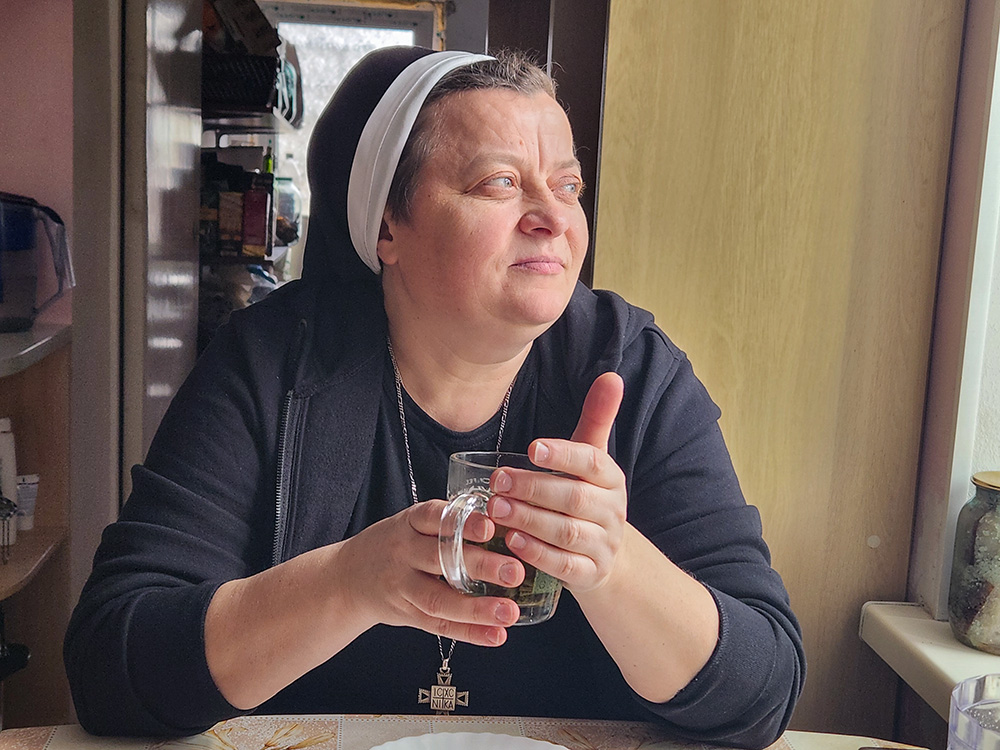
Sr. Lucia Murashko, a member of the Order of St. Basil the Great in the eastern city of Zaporizhzhia, Ukraine, during an early morning in the convent (GSR photo/Chris Herlinger)
By American standards, Sister Lucia is relatively young for a sister — 49, entering the convent in 1994 and taking vows in 2001. She remembers the exact date in 1994 — Feb. 7 — because that was 30 years to the date when we visited the villages on our small humanitarian mission.
I told her it was a privilege to share that anniversary with her; she smiled but was philosophical when I asked her about what she had told me the previous summer of Ukrainians feeling frustrated and exhausted. Sister Lucia said that remained true and that "we're all tired of the war, and our first wish is that we want to have a peace. However, it doesn't mean we give up."
Sister Lucia further acknowledged that she and her fellow citizens had all become accustomed to the war and said it is still a "very unnatural state." But she added, "We don't have a choice. We have to live to survive. If I live today, it means a victory — it's a victory over death."
How does Sister Lucia make it through the day? "To see the positive things, to see the ray of light amid the darkness. That gives us hope today and tomorrow." She paused, reflecting on the rhythms of her vocation. "God works better in our situation than we do. He wants us to live in peace with ourselves. But the responsibility is ours, to choose what we want to see, to see his presence in the everyday."
Advertisement
People will say, in the midst of this situation, "that there's no God. I understand that feeling. But I know God is with those who are suffering and with those who are doing something good. I know God cries with the people who cry. I see a God who has suffered, and I know a God who stays with those who are protecting us. I know God is on the side of those who choose to do good."
The good is all around Sister Lucia; she and her fellow sisters radiate goodness, but the goodness is now highlighted against real challenges. The worst days came after Ukrainian forces destroyed a well-known bridge in the east, prompting intense Russian bombardments.
"We were being bombarded every night," she recalled, shaking her head, her usually relaxed body tensing at the memory. One time, Zaporizhzhia was hit 16 times by the Russians. "We couldn't sleep normally," she said. "Zaporizhzhia is so close to the front lines. You don't feel comfortable or ever totally rested."
That takes a toll. While visiting her congregation's monastery in the eastern city of Lviv, Sister Lucia recalled that even hearing a door slam alarmed her. Luckily, there had not been a bombardment over Zaporizhzhia since January — though there was at least one a week after I left the city, in February. (More followed in March, but through a text message, Sister Lucia told me the sisters at the convent were fine.)
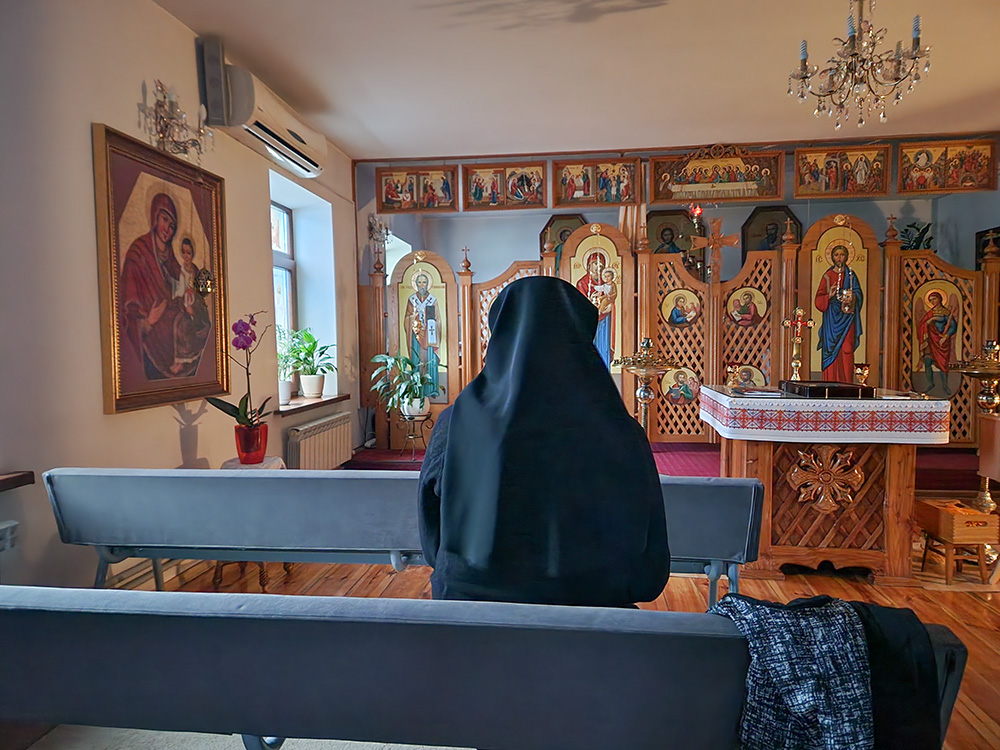
A member of the Order of St. Basil the Great prays in the small chapel of the convent in the eastern city of Zaporizhzhia, Ukraine. (GSR photo/Chris Herlinger)
Of the sirens, she commented, "You start to ignore them. If you go to the basement, you start to think that you have to live there," she said of earlier experiences. Now, she declared, "We just live and hope God protects us. Our only protection is him."
Sister Lucia said that in the first year of the war she was constantly busy delivering and organizing aid shipments. The convent was overrun with aid. "We worked so hard that we couldn't believe we did it," she said. But she now suffers from a bad back, an occupational hazard.
Though Sister Lucia said it can be frustrating not to have the same amount of material assistance as before, it also means that she and her fellow sisters are not as stressed or overwhelmed with work. The convent has become less crowded now. In the early days, displaced persons would come for a night or two, "to wash, to sleep, to eat. We helped them get further ... we helped them get to Poland, especially people with physical needs."
The small convent kitchen remained quiet as we spoke, and light began to emerge, though it was obscured behind a cloud-filled sky. The morning stillness, Sister Lucia remarked, contrasted with the days when bombardments rocked Zaporizhzhia, disturbing the peace of the city — and the convent.








